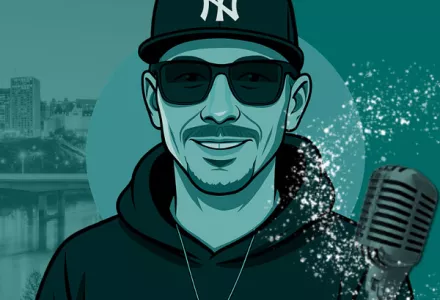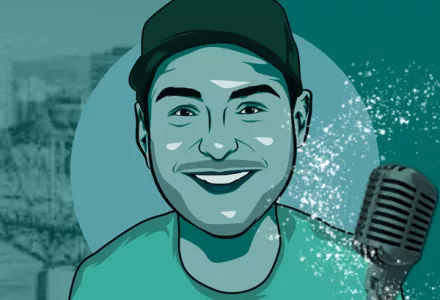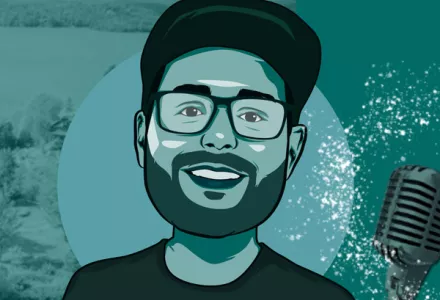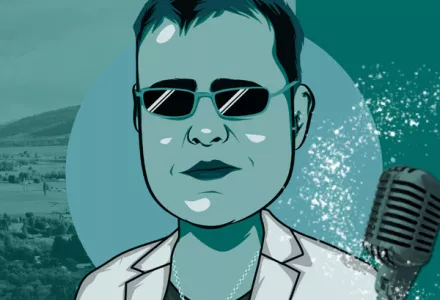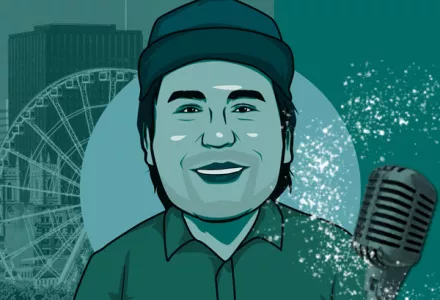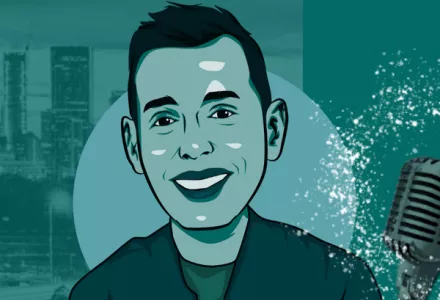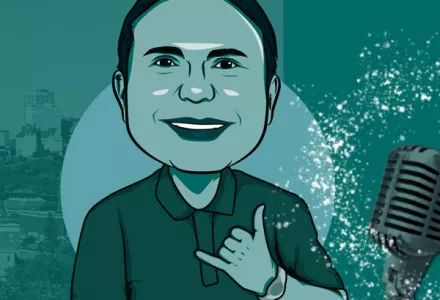At CANNA we’re excited to share passionate grower stories from across Canada that resonate with our community and inspire us to “grow big or grow home”.
GROWER SPOTLIGHT
Awesome. So my name is Aaron Anderson, Vice President of Sales, and I've been with TRICANNA for almost a year, having been Vice President of Sales for over five years. This is my journey. We're primarily focused right now in British Columbia, as we're a smaller producer at this time.
Could you tell us a little bit more about your products?
So, my best-selling product, which I happen to be wearing, is FAFO, "fuck around and find out." This is a micro partner of ours that grows some of the best fire in town. It's produced in Port Coquitlam and the Tri Cities. There are a couple of really passionate young individuals who water every single plant and connect with each one at that level. Their product produces some of the most trichome-dense, aromatic plant products possible.
What is your vision for the future of the cannabis industry, and how do you see your company contributing to it?
My vision for the future of the cannabis industry is that we need to learn to be a tad patient. We're literally only about seven years old now. Last week, we had a drop of a bunch of really awesome upgrades to our regulatory framework, which will come into effect next year, but it's an evolution. So where I see it going, I mean, it's going to continue to evolve. We're going to continue to capture the hearts and minds of more people. We'll see broader and better sales and marketing tactics, as well as a churn under the hood as more and more licenses come online every Friday. Finding our place in the market is going to be an ongoing process. The exciting thing is, it's still new and fresh. Every year, there seems to be a new top 10, which is opportunistic for anyone who wants to understand how to get themselves out there and do better. It's not too late, and the market is going to continue to evolve.
Where do we see ourselves? I'm a standalone processor, so I don't do well if you're not doing well. My goal is to work with as many partners as promptly as possible. If I lean into my legacy roots, I mean, I once upon a time used to be a broker to some capacity. I'm used to working with others to meet a common goal. So instead of trying to be vertically integrated, it makes more sense to work with people that fit a piece of my puzzle.
What steps do you take to ensure the highest quality and consistency in your products?
I take a slightly different approach to that, in the sense that I'm very data-centric. Because of that, I'm kind of my own enemy, being a geek for numbers. When I look at what ultra-premium does in terms of sell-through and market share, it's actually really small and very competitive. So instead, I try to take a step back and look at products through a "good, better, best" lens. I mean no disrespect to growers and their products, but if I look at different metrics—from age, to bud structure, to aromas, to look and feel, to moisture, and all the different KPIs necessary for a premium product—I can sell anything at any price if my partner is willing to work with me.
Long story short, I see more value in the mid-tier than the top-tier. Ultimately, there's a better run rate in the mid-tier than the absolute top-tier. When you do the top-tier, the problem is that customers are not loyal; they're always trying all the new ones. So what happens is you're hot for a month or two, and then you drop. It's hard to stay up there, but the mid-tier just coasts.
Ultimately, once you realize you're going to take a little less per gram but are still profitable, you'll sell three to four times more volume. So, I love that mid-tier.
Can you share a key moment in your career that was a turning point for you?
Once upon a time, I joined forces with a Kuwaiti billionaire who had a dream of building one of Canada's largest cannabis companies. At that time, we didn't have a single license. Selfishly, one of those locations he had acquired was a company that I worked for, which was my first company. That company lost its license three weeks before legalization due to some tomfoolery on their part. I lost my money, and I lost my family's money. This billionaire gifted me the opportunity to give back that very asset to me, to bring it to market, along with other things that a billionaire can afford. Over the course of four years, I was able to build one of Canada's biggest brands and companies to market, something I'd never done before. In our third year, we did $64 million, and in our fourth year, we did $100 million. Now, I'm back with the normal people. You hit the top, and you come back down. It comes with different stresses, but it was an accomplishment. At one point, we were doing about 1,500 kilos a month, which felt a little gangster to be able to sell 1,500 kilos a month. That felt good.
What role does innovation play in your business strategy, and can you share any recent examples?
Innovation is absolutely important. Ultimately, what role does it play? It's an ongoing science. When the customer sees something that came to market that's fresh and new, they think it just came out now, but it's something we've been working on for 9 to 12 months. It plays a key role in staying ahead. It can be as simple as new genetics, but it can also involve creative new formats, new styles of hardware for vapes, or different types of infused pre-rolls, etc. There are lots of ways to innovate, but if you're not innovating, you will die. You have to continue to try.
How important do you believe knowledge-sharing to be in the commercial cannabis community?
Knowledge-sharing is absolutely critical because this is a complicated space. Unfortunately, most of us don't take the time to read all the rules and regulations. Beyond the Cannabis Act, you've got provincial laws, municipal laws, the retail handbook, marketing licenses you might need in a specific province, and different sampling rules in other provinces. It's a lot of reading. I printed it all out because I'm old school; I like to go through it with a highlighter and take notes.
Long story short, I did that for myself to educate myself and understand what's going on. I use that knowledge to inform other people to help them get bigger and better. Ultimately, if they don't understand it, in a retail store, if I'm the only good product, we don't have an industry. I need competition. We need a lot of good products because we need people to come and shop in the stores and be wowed by all the amazing options, not all the boring stuff. Knowledge-sharing is important because you want to empower those around you.
I've definitely had a hand in helping quite a few key players out there, assisting them with many things. I helped Nextleaf take a different direction in their early days. I helped Joint Venture make a few key decisions that changed the world for them. I've helped a lot of retailers with different perspectives. I'm really passionate about this industry and sharing information. If I can provide simple information to right-size the problem you're about to make, you'll save so much time.
If you could debunk one myth about the cannabis growing industry, what would it be?
F**k you and your CoA. How come all the potencies are over 28% no matter what the product is?
I'm not advocating against proper lab testing. Don't get me wrong, I think that the whole Pandora's box needs to be outed completely. How come I can smoke an 80% or 86% vape and get as high as a 22% joint? Theoretically, I'm supposed to care whether a flower is 22% or 28% because maybe it'll make me more inebriated. Yet, the 86% vape will wear off faster than the 22% joint. Why am I caring about a 22%, 24%, 26% number on the bag? That number unfortunately creates really bad consumer behavior and more challenges.
Someone might grow something amazing at 23%, but it's beautiful, with great bud structure and aroma, but I can't pay more than 85 cents because nobody will take it, all because of that CoA. I would like to kill the CoA as it relates to potency. I believe in it for pesticides, molds, and contaminations, but I would love to remove potency from the label.
How do you foresee the global cannabis market evolving in the next five years, and what steps is your company taking to stay ahead of these changes?
I would not stay ahead of the changes; I would evolve with them. If you invest ahead of them, you will be destroyed because you're assuming the United States is going to legalize it on X when it's actually going to be Y. I would take a more relaxed approach. There is already a global market, so enjoy it while it exists. It's going to continue to change, so evolve with it. But if you try to predict ahead of it and make investments, you're making a high-risk, high-stakes investment that can be changed with a stroke of a pen. I would wait for that pen to dry and then make a decision on what your next move is.
Everything you do takes years to accomplish, and by the time you finish, you're living in a new now. So, my advice would be to not get ahead of the regulations, but stay behind them.


